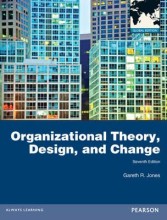Differentiation and integration
11 important questions on Differentiation and integration
What does organisational complexity mean?
-> Degree of differentiation
What is division of labor?
What is an organisational role? How does it help managers that a person has a given role?
A person in a role with identifiable tasks can be held accountable.
- Ex. A chef is expected to deliver good, appetising food.
- Higher grades + faster learning
- Never study anything twice
- 100% sure, 100% understanding
What is the difference between a function and a division?
Division: Collection of functions or departments that share responsibility for producing a particular good or service.
As organisations grow they differentiate into five different kinds of functions:
- Support functions
- Production functions
- Maintenance functions
- Adaptive functions
- Managerial functions
Describe the different types of functions.
- Support functions
- Controls the relations with the organisations environment and its stakeholders.
- Purchasing, sales and marketing, public relations
- Production functions
- Manage and improve the production function to make sure more value is created.
- Production operations, production control and quality control
- Maintenance functions
- Makes sure the departments are able to keep operating
- Personnel, engineering
- Adaptive functions
- Allows the organisation to adapt to changes in the environment
- R&D, market research, long range planning
- Managerial functions
- Control and coordinate activities within and among departments
- Managers at all levels that work towards company goals.
How should simple and complex companies balance differentiation and integration?
In simple companies: In a simple organisation there is little need for integration and therefore it only needs simple integrating mechanisms.
Why do managers have to be sure not to differentiate or integrate their organisation too much?
What two things must they do to decide the level of integration and differentiation?
They must:
- Carefully guide the process of differentiation to build core competence and competitive advantage
- Carefully integrate the organisation by choosing appropriate integrating mechanisms.
What is the consequence of an organisation that is too centralised? Why does this occur?
When responsibility and risk taking declines, the whole organisational performance declines. People do not take advantage of new opportunities and decision making gets slow.
What is the main difference between a centralised and decentralised organisation?
Decentralised: Important decisions about organisational resources and initiatives to new projects are delegated to managers at all levels.
What are the advantages and disadvantages of centralisation and decentralisation?
- Advantages:
- Top managers can coordinate organisational activities and keep the organisation focused on the goals.
- Disadvantages:
- Top managers get overloaded with day-to-day issues.
Decentralisation
- Advantages
- Promotes flexibility and responsiveness
- Managers are accountable for their actions but can later reach bigger responsibilities
- Personal skills are shown
- More motivation to perform well for the organisation
- Disadvantages
- Too much authority delegated: Planning and coordination becomes difficult
- Organisation can lose control of its decision-making process.
What is the ideal balance between centralisation and decentralisation?
Managers at all levels can make important decisions to adapt to the current situation.
The question on the page originate from the summary of the following study material:
- A unique study and practice tool
- Never study anything twice again
- Get the grades you hope for
- 100% sure, 100% understanding






























